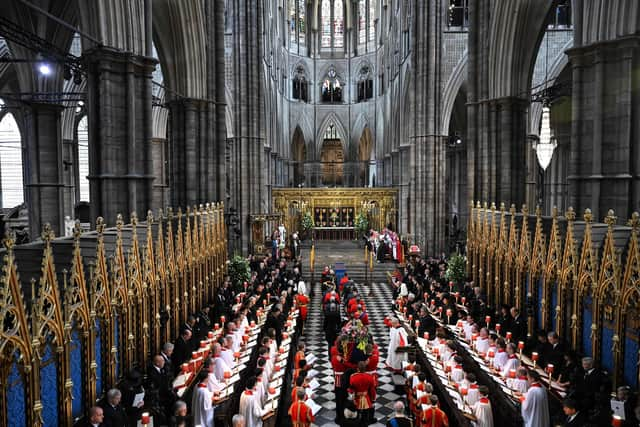As Kate Forbes discovered, secular intolerance of religious views is growing – Richard Holloway
I was moved by the solemn procession of her cortege up the Royal Mile and the service that followed in Saint Giles Cathedral. Days later, I watched her funeral in Westminster Abbey, and again I was moved. On May 6, with millions of others, I’ll watch the coronation of King Charles III, also in Westminster Abbey. Again, I expect to be moved by the service.
At the time of the accession of Queen Elizabeth II to the throne in 1953, I was a young soldier, doing my two years of National Service in the army, and I can remember her coronation. I was billeted in the barracks of the Scots Guards depot in Caterham in Surrey at the time, and I can recall the excitement of the posh young Guards officers who were expecting to be part of the ceremony in London on June 2, that year.
Advertisement
Hide AdAdvertisement
Hide AdBritain was a dreich and depressing place at that time after the war, and my memories all seem to play in black and white, not in colour. The coronation cheered us up, not that many of us had televisions to watch it on. But we read about it in the newspapers and saw clips of it in the old newsreels that were part of the programme in the cinemas of the time.
The coronation was conducted by the Archbishop of Canterbury, Geoffrey Fisher, a former public-school headmaster with a fatherly manner, who made sure the young queen swore to uphold the Protestant religion and protect the Church of England and its clergy. The only ecumenical element in the service was the involvement of the Moderator of the General Assembly of the Church of Scotland, James Pitt-Watson, whose only task was to present the new queen with a copy of the Bible. It was a defiantly Church of England occasion, albeit with a brief acknowledgement of the existence of the Church of Scotland, to which the new queen promised to adhere when north of the Border.
It is reported that this time the coronation of the new monarch will have a much more ecumenical and inter-faith flavour. In 1994, when he was Prince of Wales, the King announced that he wanted to be a ‘defender of faith’ and not just of the Church of England, because Britain is now a multi-faith community. That may be true, but it is also the case that Britain is an increasingly secular and post-religious society. The last census revealed that most people under 40 now describe themselves as having no religion. So, is Britain a religious or a post-religious society? And does it matter, anyway?
The best description I can think of is that we are a secular society that enjoys a bit of religious pomp and ceremony from time to time. We still want religion around to help us mark the solemn stages of our journey through life, but we want it kept under control. And with good reason. Religion taught us to love our neighbours, but there were times when it compelled us to hate them, as our own history demonstrates – the toxic residue of which can still be seen screaming from the stands on Old Firm football matches between Rangers and Celtic.
After the Protestant Reformation of the 16th century, Europe was convulsed by centuries of religious warfare, in which Christians slaughtered each other in the name of their competing versions of the faith. Emerging secular consciousness during the Enlightenment in the 18th century drew two important conclusions from the disruptive effects of religion’s propensity to violence.


The first was that the authority of religious leaders should be confined to their own faith communities: church and state had to be separated. This process of separation happened in different ways and at different speeds in Europe, and was never perfectly achieved anywhere. It probably came closest in France, where everything in the public realm was constitutionally established as fully secular.
It was a more untidy and gradual process in Britain, where bishops of the Church of England were allowed to sit in the House of Lords and take part in the parliamentary process, without any democratic mandate from the electorate. However, their mitres seem to be hanging on shoogly pegs at the moment, because of their opposition to equal marriage, so their days may soon be over.
It was the second element in the secular strategy that had the greater impact: the outlawing of religious discrimination and intolerance. This enabled the emergence of religious pluralism in European societies, with an inevitably eroding and relativising effect upon the authority and influence of any single religious denomination.
Advertisement
Hide AdAdvertisement
Hide AdThe French philosopher Voltaire said that if you have two religions in your land, they will cut each other’s throats, but if you have 30 religions, they will dwell in peace. In Britain that is what happened, enabling us to absorb the arrival of people of other faiths, such as Muslims, with relative ease and without too much disturbance.
The flipside of this openness within faith communities towards those who disagree with them has been the emergence of a new brand of secular intolerance towards those whose religious views do not conform to current norms. In spite of its vaunted liberalism, the secular mind is intolerant of those who practise a religion that does not conform to its own values. Kate Forbes has become a victim of this new brand of intolerance. I hope she’ll tough it out and take what comes.
Richard Holloway, a former Primus of the Scottish Episcopal Church, is a Scottish writer and broadcaster
Comments
Want to join the conversation? Please or to comment on this article.